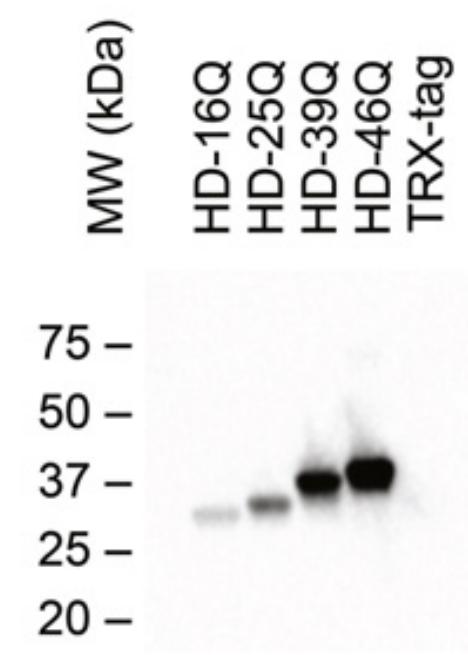Polyglutamine Monoklonaler Antikörper
Polyglutamine Monoklonal Antikörper für WB
Wirt / Isotyp
Maus / IgG2b, kappa
Getestete Reaktivität
Anwendung
WB
Konjugation
Unkonjugiert
CloneNo.
MW1
Kat-Nr. : 65239-1-Ig
Synonyme
Galerie der Validierungsdaten
Geprüfte Anwendungen
| Erfolgreiche Detektion in WB | Recombinant protein |
Empfohlene Verdünnung
| Anwendung | Verdünnung |
|---|---|
| Western Blot (WB) | WB : |
| It is recommended that this reagent should be titrated in each testing system to obtain optimal results. | |
| Sample-dependent, check data in validation data gallery | |
Produktinformation
65239-1-Ig bindet in WB Polyglutamine und zeigt Reaktivität mit
| Getestete Reaktivität | |
| Wirt / Isotyp | Maus / IgG2b, kappa |
| Klonalität | Monoklonal |
| Typ | Antikörper |
| Immunogen | Rekombinantes Protein |
| Vollständiger Name | Polyglutamine |
| GenBank-Zugangsnummer | N/A |
| Gene symbol | |
| Gene ID (NCBI) | |
| Konjugation | Unkonjugiert |
| Form | Liquid |
| Reinigungsmethode | N/A |
| Lagerungspuffer | PBS with 0.09% sodium azide. |
| Lagerungsbedingungen | Store at 2-8°C. Stable for one year after shipment. 20ul Größen enthalten 0,1% BSA. |
Hintergrundinformationen
Huntington's disease is a neurodegenerative disorder caused by the expansion of a polyglutamine (polyQ) repeat in the N-terminal portion of huntingtin protein to a length above 35-40 units (PMID: 26047735; 19507258). The mutational expansion of polyglutamine above a critical length causes a toxic gain of function in huntingtin and results in neuronal death. In the course of the disease, expanded huntingtin is proteolyzed, becomes abnormally folded, and accumulates in oligomers, fibrils, and microscopic inclusions (PMID: 25336039). The anti-polyglutamine (polyQ) antibody MW1 specifically binds the polyQ domain of huntingtin exon 1. On western blot, the MW1 clone strongly prefers to bind to the expanded polyQ repeat form of Htt, displaying no detectable binding to normal huntingtin (PMID: 11719267).


